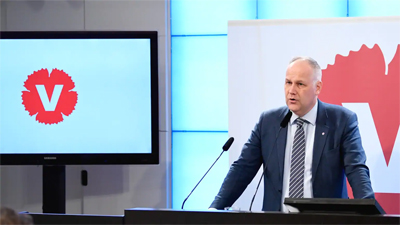
pic: SvD Ari Luostarinen
After the first suggestions regarding the directives and staffing of the coming corona commission were rejected by a majority of parliament, the government has now put a plan together for the corona commission. In a press conference this afternoon, DN reports, the government announced that lawyer and legal consultant Mats Melin will head up the commission, and that the commission will be comprised of six or seven other, as yet unnamed, persons.
When the idea of a commission was first floated, the governing Social Democratic party’s suggestion was not to publish any results until after the next election. “We want to remind everyone that what we hear from the municipalities and regions is that they’re a little tired of reporting, and that they need to focus on dealing with the virus. I don’t want to have a situation in which we put yet another burden on them” was the word then from Prime Minister Löfven. In addition, it was said, the staffing of the commission would largely be made up of people with specific party affiliations.
The response from the majority in parliament was along the lines of “nice try,” and the government has since been forced to back away from both suggestions. Which is good since, as DN reported a couple weeks ago, the government has a poor track record when it comes to corona-related transparency. Emails have a way of being erased, DN wrote, and meeting notes have a way of being classified as “working material” and are thus not part of the official (and public) record. This can still happen in the future, but at least the grossest risks might be avoided by more strongly separating the commission from party politicians.
The corona commission that will be formed sometime in the near future must now be staffed by people who have the trust from all the different parties in parliament. “I think it’s extremely important that those who are chosen have the trust of all parties, and that they can’t be suspected of favoring one party’s interests over another’s” said Left party leader Jonas Sjöstedt to SvD. In a remarkable constellation, the Sweden Democrats, Christian Democrats, and the Center, Liberal and Moderate parties are all united on this. (No word from the Green party but one must assume that they’re somewhere behind the Social Democrats.)
The plan is that Sweden’s elder care during the corona crisis will be the focus of the first part of the investigation, with a report due to be presented in the fall. A more in depth report will come in the fall of 2021, and then on February 28th, 2022, the final results of the commission’s findings will be presented. “I’m looking forward to seeing the results” said Löfven.
Another important date is the next election: September 11, 2022.









